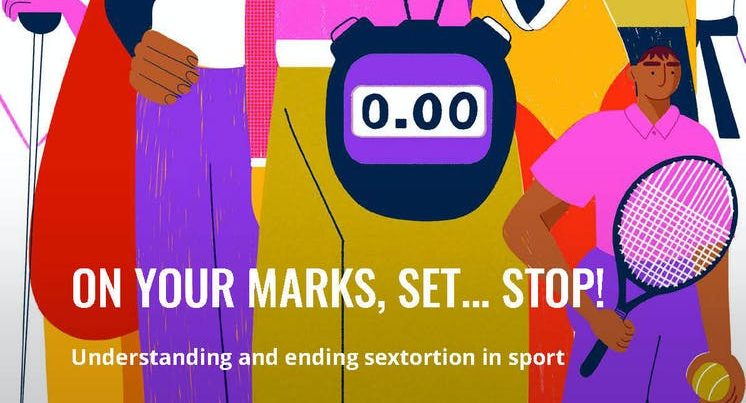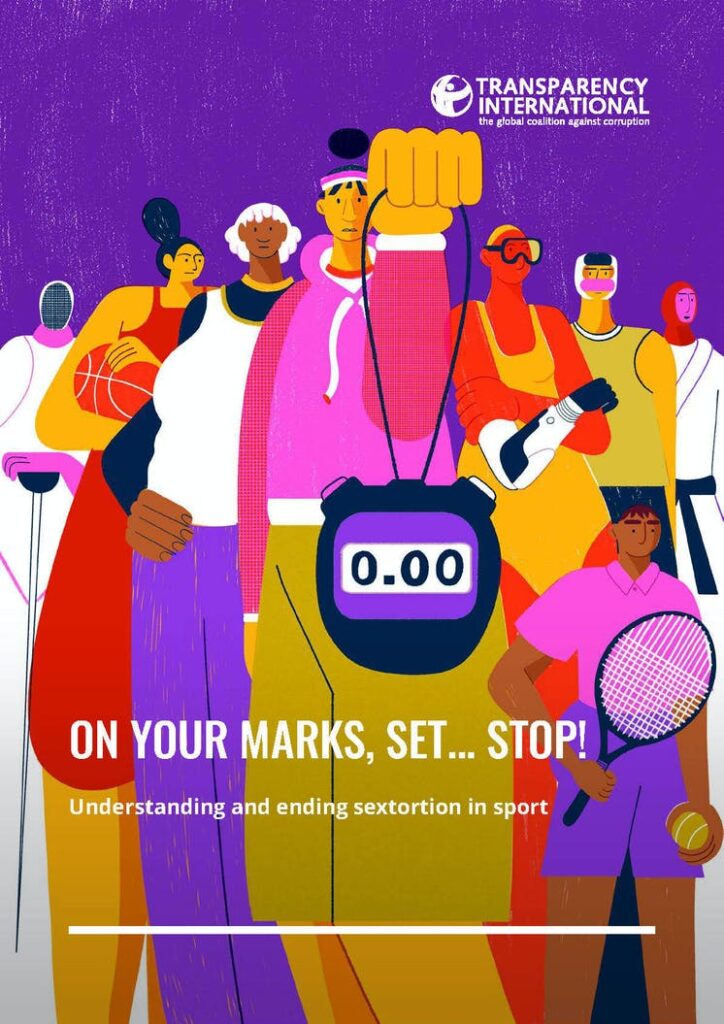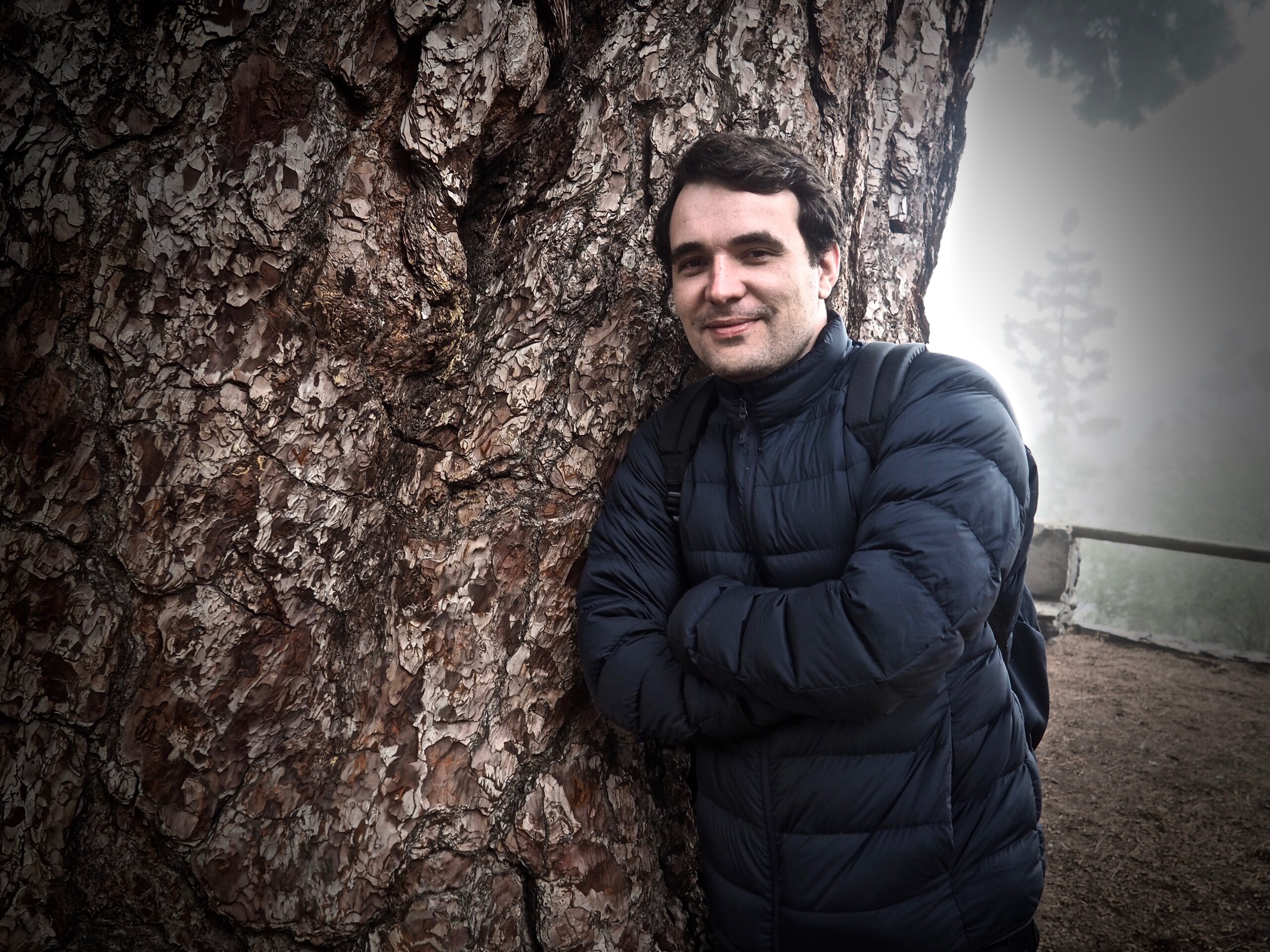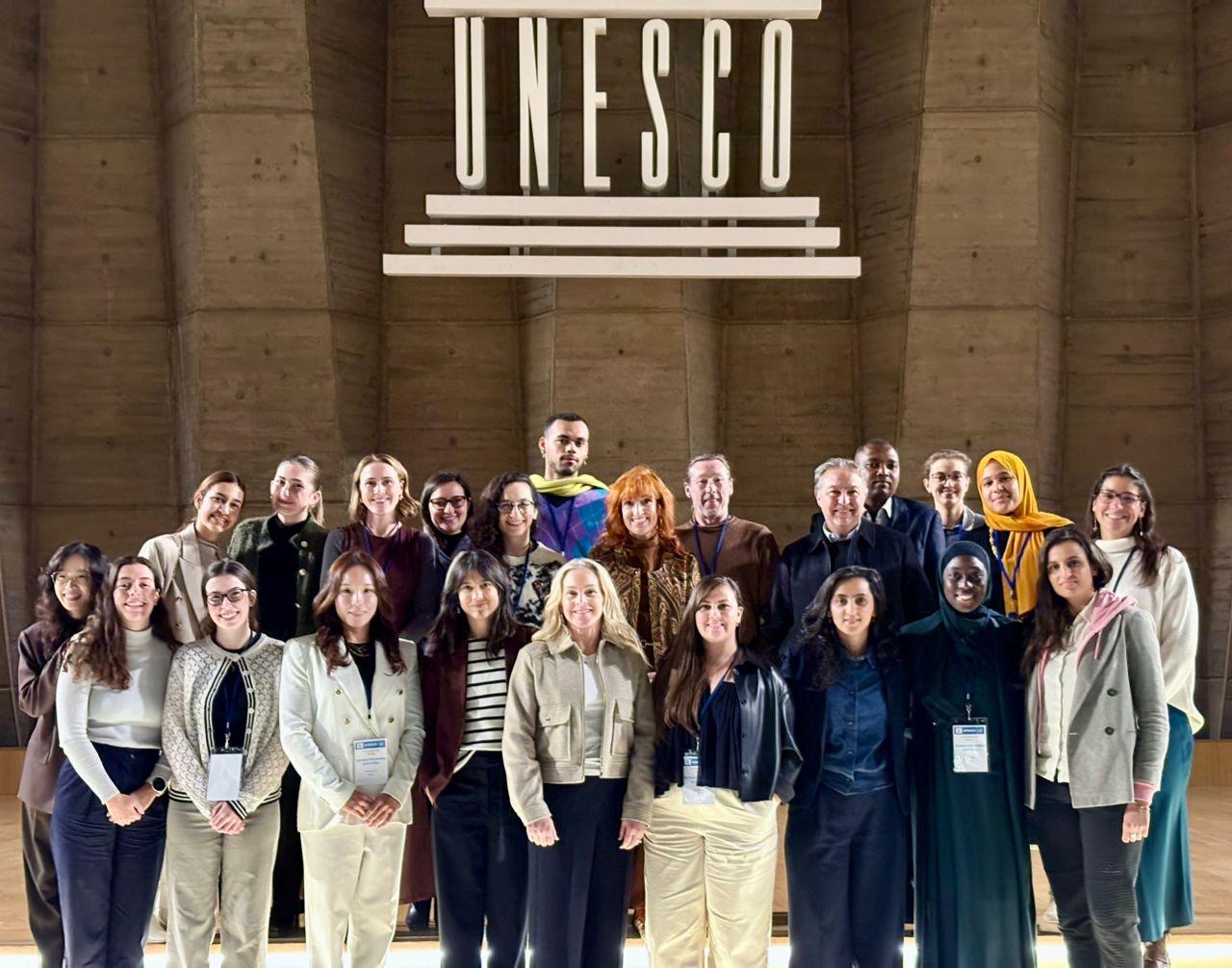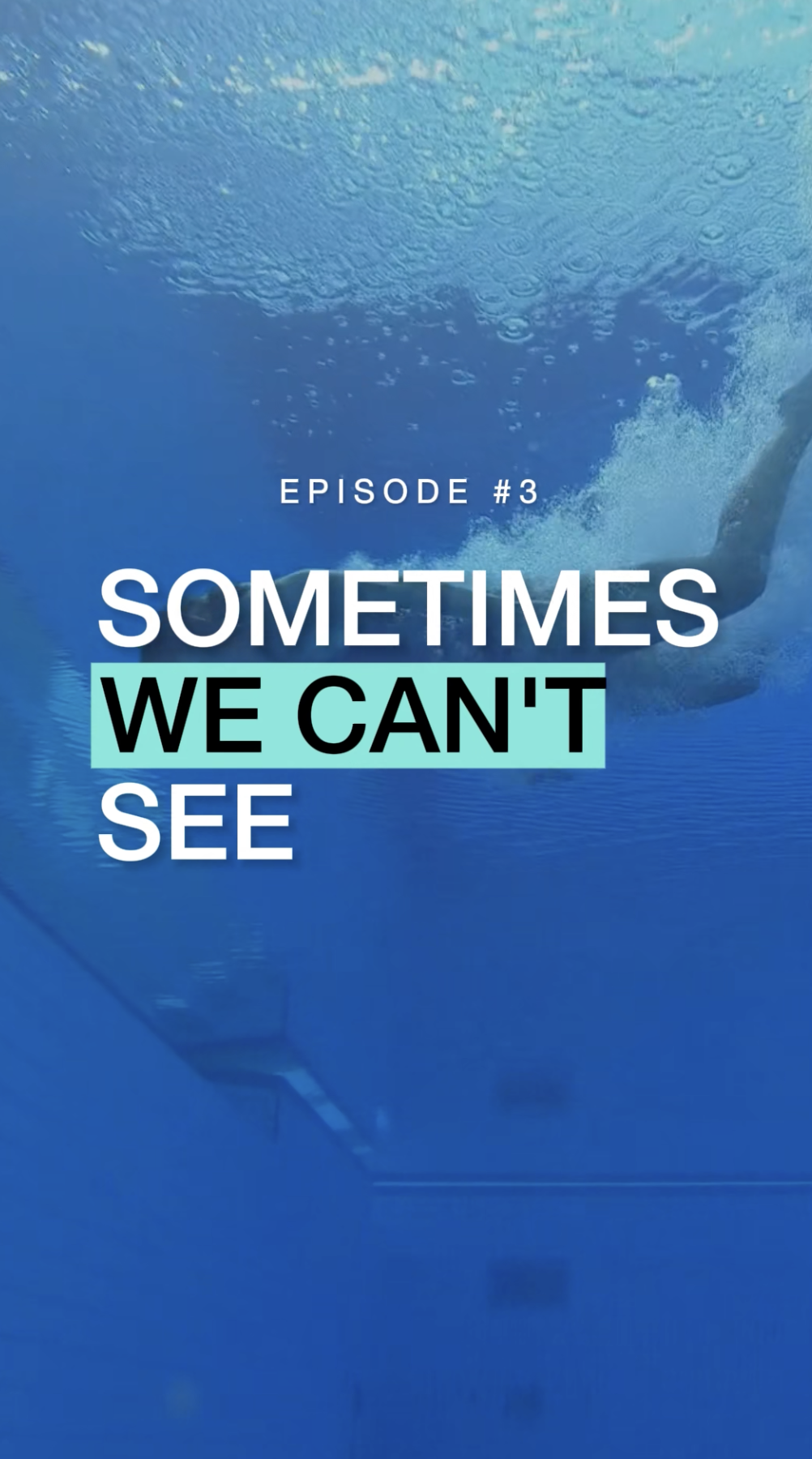Sextortion – defined broadly as the abuse of power to obtain a sexual benefit – is pervasive and widespread. It occurs across the globe and in many sectors, including education, the police, the courts, the civil service, refugee camps, passport control and many others.
Survivors/victims can suffer serious, sometimes life-changing, consequences. These include loss of self-esteem, poor academic performance, self-harm, depression, anxiety, substance abuse disorders and suicide.
Sextortion tends to go largely unreported. Those affected are typically confronted by social stigma and cultural taboos, and it is often difficult to prove the abuse. In many cases, there are no safe, gender-sensitive reporting mechanisms that can provide the support that survivors/victims of sexual abuse often need.
This report focuses on sextortion in sport, as a sector that is particularly vulnerable to sextortion, but has great potential as a channel to promote positive role models. Building on Transparency International’s 2020 study Breaking the Silence Around Sextortion: the Links Between Power, Sex and Corruption, it aims to identify the root causes of sextortion in the sport sector and inform the design of measures to prevent, report and sanction sextortion and other forms of sexual abuse in this sector.
The report draws on reported cases of sextortion and other forms of sexual abuse from around the world, with a focus on Germany, Mexico, Romania and Zimbabwe. While the report aims to address sextortion rather than sexual abuse more broadly, it also recognises that the two are closely related and efforts to address one are likely to have positive knock-on effects on the other. Therefore, the report includes some discussion of efforts to prevent, report and sanction sexual abuse more generally, but with an emphasis on measures that address the specific nature of sextortion.
Sextortion in the sport sector
Sexual abuse is a widespread problem that affects all sport in all regions of the world. Given that many of the most serious cases of abuse this report documents involve a person of authority as the perpetrator and include some form of explicit or implicit demand for sexual benefits, such cases can be interpreted as sextortion, regardless of whether they have been explicitly labelled as such by authorities and researchers. This would suggest that reducing the prevalence of sexual abuse, including sextortion, in the sport sector fundamentally requires greater oversight and control of those in positions of power.
The sport sector is uniquely vulnerable to sextortion due to a combination of structural, environmental and behavioural factors that generate conditions conducive to the abuse of power and sexual abuse.
Firstly, the fundamental principle of autonomy of sport governance means that there is very little external oversight or scrutiny of sport organisations. As a result, many operate with wide margins of discretion in their decision-making and a lack of transparency around such decisions, while resisting calls for meaningful change. Therefore, it is not surprising that many organisations have failed to develop adequate internal prevention, detection and reporting mechanisms for abuse.
The absence of strong external pressure for reform has led to a concentration of power within the sport sector over decades. This provides fertile ground for the cultivation of patronage networks, nepotism and “old boys’ clubs” that protect the status quo. Power is held almost exclusively by men due to the persistence of deeply rooted sexist attitudes in many sporting cultures, leading to hyper-masculine environments that are particularly conducive to the exploitation of vulnerable people and the concealment of abuse. The gender imbalance in leadership and coaching positions, coupled with a persistent gender pay gap, make women’s sport particularly vulnerable to abuse, including sextortion.
Secondly, the nature of interpersonal relationships, which are often characterised by dependency and unclear boundaries, carry specific risks for sexual abuse. This is particularly true of relationships between women athletes and their (predominantly male) coaches. These dependencies are reinforced by a sporting culture that promotes values such as endurance and loyalty, and in which the authority and expert status of coaches and other influential actors is rarely questioned. In these circumstances, athletes are conditioned to tolerate abuse and to put the well-being of the team above their own so abuse goes unreported. All of this occurs in a context in which close physical and emotional contact is common and often largely unsupervised, which provides greater opportunities for emotional, physical and sexual abuse to go undetected.
Together, these factors have led to the emergence of a widespread culture of silence and impunity in the sport sector when it comes to all forms of abuse. This culture persists in part because sport organisations are often more concerned with protecting their reputation than meeting the needs of victims and survivors or learning from their mistakes. The result is that, in many cases, perpetrators are allowed to stay in the same organisation or move to others without consequences.
Addressing sextortion in the sport sector
To effectively tackle sextortion and other forms of sexual abuse, these underlying factors should be addressed. Greater oversight and control of those in positions of power must be ensured, and sextortion must be detected or reported, investigated and adequately sanctioned.
First and foremost, there is an urgent need to implement strong prevention frameworks in the sport sector to help ensure that these abuses do not occur. Prevention should be the first line of defence. To be effective, prevention efforts against sexual abuse generally and sextortion specifically, must address systemic governance weaknesses and the behaviour and conduct of individuals in positions of authority.
Unfortunately, measures to date have tended to depend almost exclusively on (ineffective) reporting mechanisms and sanctions to deter abuse. Even where they are in place, prevention measures are generally narrow in scope, with an emphasis on safeguarding athletes (in particular children) from abuse rather than addressing underlying structural imbalances in sport governance. There has been a disconnect between policy and procedures at global, national and grassroots levels so prevention frameworks are often not cascaded down the system. Among smaller sport organisations, prevention measures are often considered unnecessary or not prioritised. In some cases, the acknowledgement of the need for prevention measures is even interpreted as an admission that sexual abuse exists within the organisation. This points to the need for greater awareness-raising about the benefits of prevention, to overcome resistance.
Reporting mechanisms and sanctions for abuse have also proven largely ineffective at ensuring that abuse is adequately detected and addressed. The widespread stigma, shame and guilt that victims/survivors frequently experience means that many cases of sexual abuse are not reported. This is especially true where reporting mechanisms lack independence and do not facilitate safe, trusted opportunities to inform sport organisations about concerns. When athletes do speak up, they are often treated with distrust or contempt, and may face retaliation. Retribution is common, including mistreatment, threats and exclusion from teams and important events.
Sport organisations often lack the capacity and expertise to detect and investigate reports of abuse, including cultural and linguistic expertise, and understanding of gender dynamics, sexual abuse and trauma. In many cases of abuse, the parties accused are either senior leaders of the organisations or the abuse happens in their presence/under their watch, which brings into question the extent to which those tasked with investigating and sanctioning complaints can act independently from their employers or superiors. Given the challenges in attempts to deal with sextortion and other forms of sexual abuse internally within sport organisations, independent investigation and sanctioning should be widely established to ensure that perpetrators are held accountable for their actions.
Key recommendations
The following recommendations target key actors to address structural imbalances and strengthen prevention, reporting and sanctioning measures across the sport sector.
Sport organisations should:
- publicly express their commitment to preventing and addressing sexual abuse, including sextortion and other forms of abuse
- actively promote the participation of athletes and other stakeholders – particularly women – in their governance, promote the development and employment of women coaches, and work to eliminate the gender pay gap among athletes and coaches
- introduce codes of conduct that are applicable to all stakeholders involved with their organisation (including volunteers), conduct vetting before recruiting people to positions of authority, and consider introducing term limits for senior officials
- introduce clear and transparent criteria and processes for decision-making
- introduce education and awareness-raising programmes to promote cultural change and gender awareness
- introduce effective internal reporting mechanisms and support the creation of centralised, independent reporting mechanisms
- ensure that cases of sextortion and other forms of sexual abuse are investigated by independent entities/ombudspersons to avoid conflicts of interest and potential attempts to interfere in investigations
- develop clear sanctioning regimes for different types of wrongdoing, including sextortion and other forms of sexual abuse
Governments and private sponsors should:
- consider conditioning the provision of financial and other support to sport organisations on the implementation of good governance standards and prevention measures
- collect, analyse and publish disaggregated data (by gender, age and seniority) on sextortion, other forms of sexual abuse and corruption across the sport sector
- incorporate sextortion into codes and sport governance policy that deal with preventing and addressing sexual abuse and do so across the sector
In addition, governments should:
- appraise whether existing legal frameworks ensure effective prosecution of sextortion and legislate to fill any gaps that are identified
Civil society organisations should:
- continue to raise awareness of the prevalence of sextortion in the sport sector and advocate for the adoption of effective prevention measures at all levels
- develop partnerships that bring together organisations with expertise on anti-corruption and gender-based violence to identify problems and solutions to sextortion, develop reciprocal training and sensitisation, and engage in collaborative research and advocacy
